In 1901, there were more deaf players on Major League Baseball teams than there have been in the 116 years since that time. They strongly influenced the game at the beginning of the 20th century, which I learned more about from reading the book Havana Heat by Darrell Brock. Strangely, very few deaf players have played baseball at that level in the years since, leaving questions about why their impact peaked and then fell.
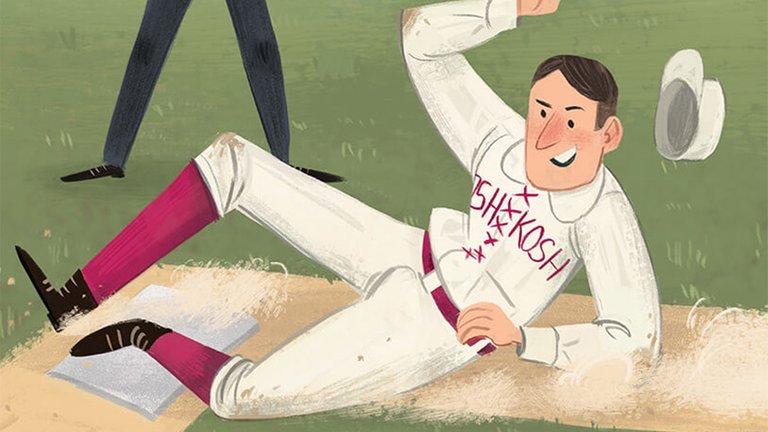
An artist's depiction of William Hoy, one of the first and best deaf players in the major leagues. (8)
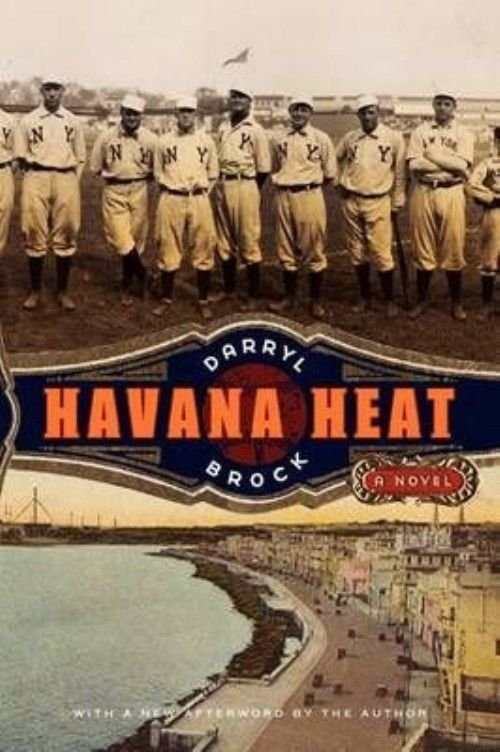
Cover of Havana Heat book.
Havana Heat is a novel that follows a portion of the life of Luther Taylor, one of the greatest deaf-mute athletes of all time. He was a pitcher for the New York Giants at the peak of their glory years, helping them win two league pennants and the 1905 championship. Brock’s story fictionalizes a trip that Taylor (probably never) took with the team to Havana, Cuba, in which he met and helped a deaf boy in Cuba. It’s a good book for a lot of reasons, but I am most thankful for the way that it illuminates the contributions of these deaf athletes of the early 1900s. You can call me a lifetime baseball fan and a student of history, but I would never have known about these players if not for Brock’s book. (1)
Baseball for Dummies
Around the turn of the century, as baseball’s popularity grew in the United States, there were a number of deaf athletes on big league teams. Nicknames have always been a big part of the sport and back then, they were used to typecast certain players. As Brock’s book points out, left-handed pitchers often were nicknamed “Lefty”, short players were called “Shorty”, German players were “Dutch”, and deaf players all carried the nickname “Dummy”.
The two most successful deaf players of that era were William “Dummy” Hoy and Luther “Dummy” Taylor. The nickname seems quite derogatory to us today, since deaf people are not stupid. They lack the sense of hearing that many of us take for granted. But Hoy and Taylor chose not to fight their nickname. Instead, they used it as motivation to work harder and show the world what they could accomplish.
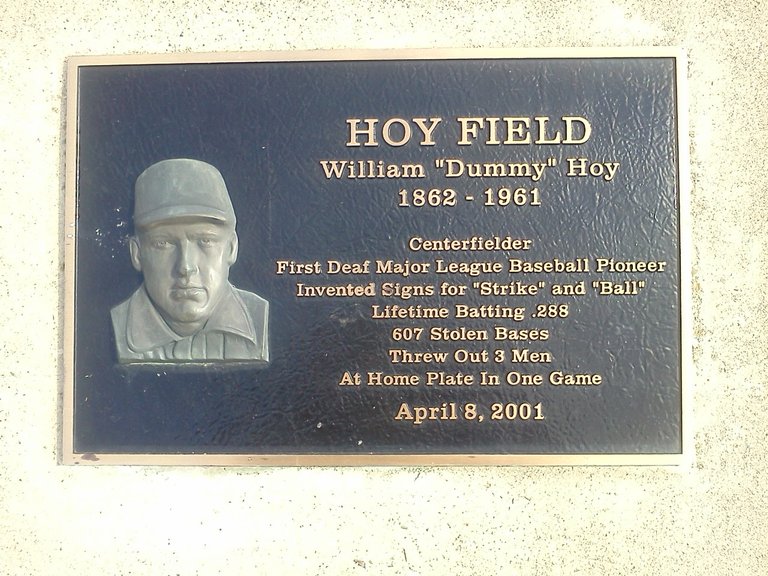
Hoy Field's Dedication Sign.
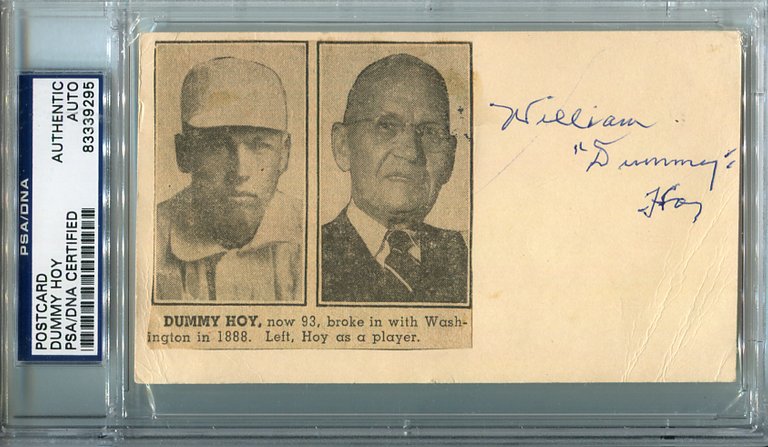
Hoy Signed Card.
In the 1880s, there were two other deaf-mute players, but baseball’s first deaf star was Dummy Hoy. From 1888-1902, Hoy played for eight different teams, finishing with a .288 batting average, 2044 hits, 1426 runs, 725 runs batted in, 607 stolen bases, and records for the most games played in center field and the most career putouts by an outfielder. Hoy is a member of the Cincinnati Reds Hall of Fame; the field at Gallaudet University (a congressionally-chartered university for the deaf and hard-of-hearing) is named for him. (2, 3)
Luther “Dummy” Taylor, the real-life pitcher who is the main character in the Havana Heat novel, was the second legitimate star who emerged from the deaf community. Taylor once faced Hoy in a game, the first time that two deaf players squared off against one another in a Major League baseball game. In 1904, Taylor won 21 games, and in 1906, he finished with a lower earned run average than his two Hall of Fame Giants teammates Christy Mathewson and Joe McGinnity. They won two pennants and a World Series title. Taylor played from 1901-1908, finishing his career with a record of 116-106, a 2.75 earned run average, and 767 strikeouts. (4)
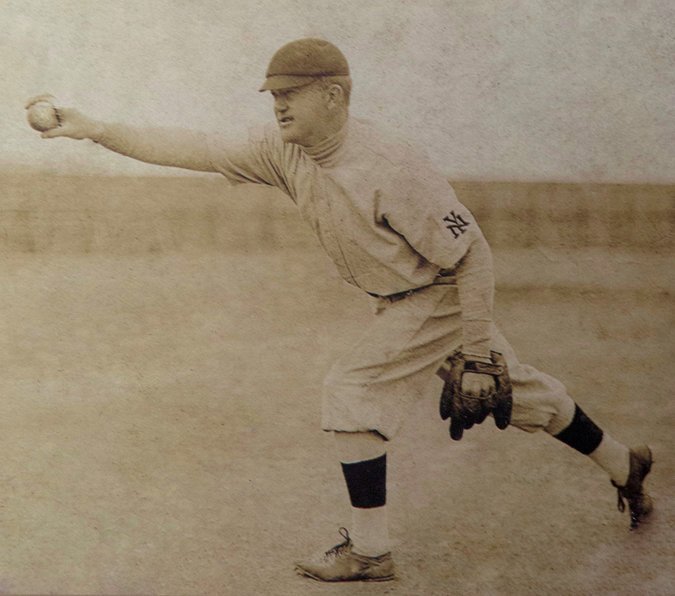
Luther Taylor Pitching. Deaf Cultural Center.
There were other deaf players at that time also. But in the years since, there have been very few.
The New York Giants: Nice Guys Who Finished First
In 1901, the New York Giants’ pitching staff included three deaf players, Dummy Taylor, Dummy Deegan, and Dummy Leitner. There were other deaf players around the same time on other teams. Since then, the only deaf players I have been able to find were one in 1914, two in the 1940s, and one in 1993. (4)
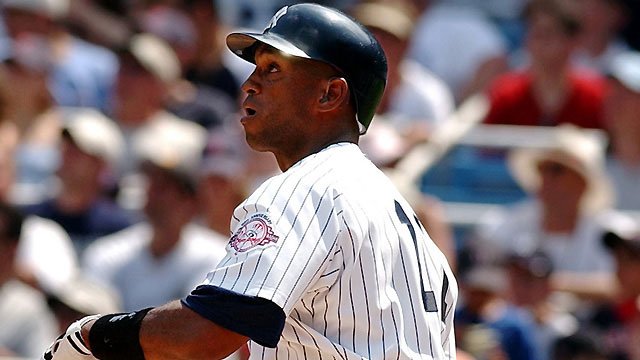
In 1993, Curtis Pride became the first deaf player in more than 50 years to play a full season in the major leagues.
Even if there were a few more mixed in over the last century, it’s unlikely that baseball has had anything close to this level of representation by disabled players at any time in its history.
So why was the early 1900s such a high water mark for deaf players? They faced discrimination and disdainful nicknames, but the leagues, teams, and fans could be quite welcoming also. This certainly was the case with Taylor’s New York Giants, which employed a number of deaf players in that period. They also won championships during the same period with great team chemistry and a manager who brought out the best in his players.
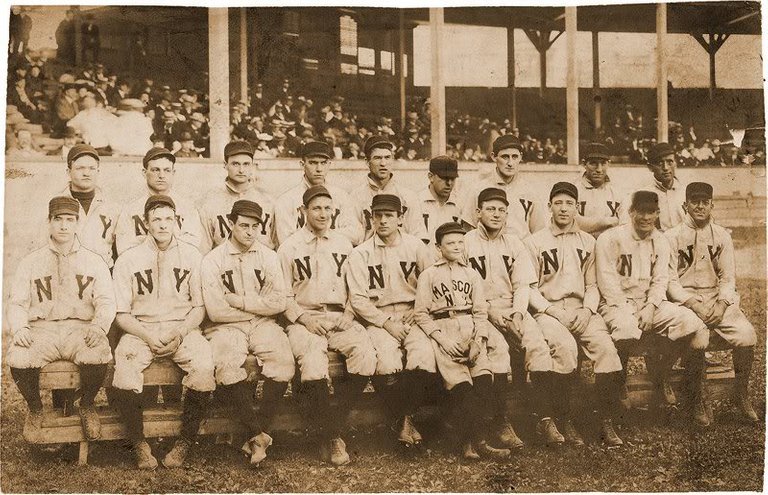
1905 New York Giants. Taylor at top left.
As biographer Sean Lahman wrote, “The Giants didn’t just add Taylor to their roster; they embraced him as a member of their family. Player-manager George Davis learned sign language and encouraged his players to do the same. John McGraw did likewise when he took over as Giants manager.” (5)
Taylor’s teammate Fred Snodgrass later added that, “We could all read and speak the deaf-dumb sign language, because Dummy Taylor took it as an affront if you didn’t learn to converse with him. He wanted to be one of us, to be a full-fledged member of the team. If we went to the vaudeville show, he wanted to know what the joke was, and somebody had to tell him. So we all learned. And we practiced all the time.” (6)
Manager John McGraw liked to keep Taylor in the dugout during games that he wasn’t pitching. He was the team clown, he spooked other teams with the sounds he made, and he also could curse out the umpires in sign language without them knowing. But one of the umpires, Hank O’Day, had a deaf parent and understood sign language so he knew that Taylor was calling him blind as a bat. The umpire signed back to Taylor that he was ejected from the game: “You go to the clubhouse. Pay $25.” (7)
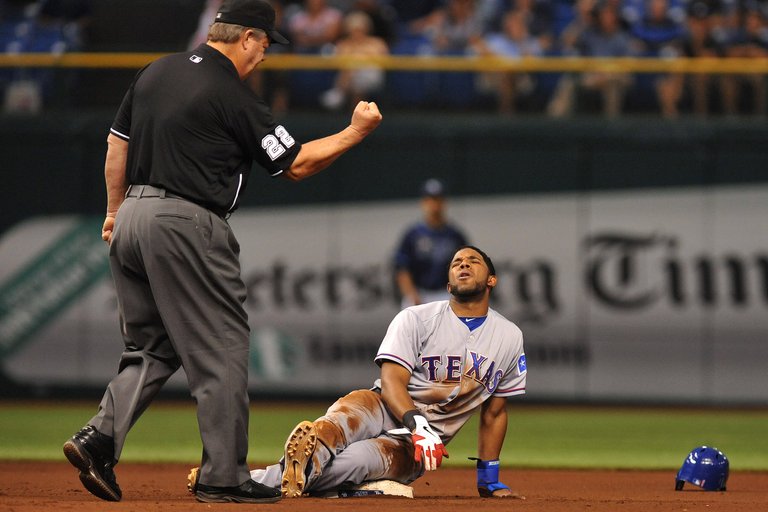
An umpire signalling that a runner is out.
Hand signals of various sorts have been important in baseball for many years. Catchers signal to pitchers about what kind of pitch to throw. Coaches signal signs to baserunners. And umpires throw hand signs for strikes, balls, and when a runner is safe or out. Some historians believe that umpires’ hand signals trace back to William “Dummy” Hoy, who reportedly asked umpires to make hand signals in his games. (8)
Other Reasons for the Early 1900s Peak in Deaf Players
Maybe so many deaf players succeeded in those days because Hoy and the early deaf players served as role models for others. And perhaps they proved to the teams of the day how good deaf players could be, prompting those teams to scout more players from schools like Kansas School for the Deaf, which was Luther Taylor’s alma mater and the school he returned to work at once his baseball career had finished. (1)
Also, within a few years, George Herman “Babe” Ruth became the game’s first legitimate slugger, belting long home runs that would change the game forever. Whenever the game changes, teams start looking for different kinds of talent, and Ruth’s rise signaled the end of an era when games were won with fundamental skills and fewer runs.
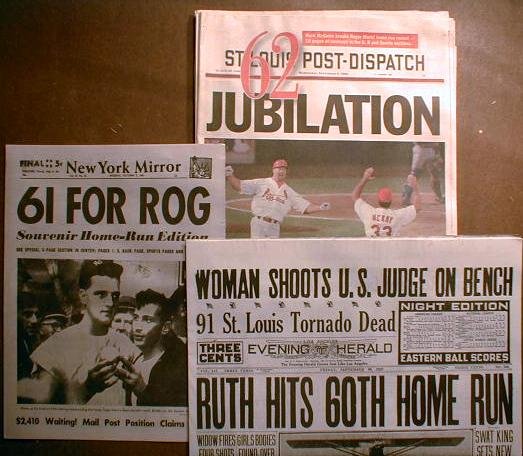
The live ball era began in earnest with Babe Ruth.
That’s not to say that deaf players could not have succeeded in the live ball era that Ruth ushered in. There simply were fewer people (handicapped or not) who had the athletic skills to succeed at such a high level, so perhaps even a community with some fundamentally good players had a harder time finding them roles in the major leagues. And later, when players of non-white races entered the game, there was a new influx of talent that made the leagues even more competitive. Still, one would have expected at least a few more top quality athletes would have emerged from the ranks of the deaf community; their almost complete absence on MLB rosters seems to indicate the disappearance of that career pathway to baseball that once existed for the Hoys and Taylors.
If I had to guess, I’d say that all of these reasons probably factored into the larger number of deaf players in the early 1900s. Particularly notable was the welcoming attitude of that team many of them played for, the New York Giants. And perhaps that team’s practices provide a model for how professional sports teams today could do a better job of encouraging and attracting the best athletes from non-traditional communities. Disparaging nicknames aside, when everyone is as open and accommodating to people from other backgrounds, it benefits society as a whole.
Sources:
(1) Brock, Darryl. Havana Heat (University of Nebraska Press, 2000).
(5) Lahman, Sean. Dummy Taylor, in Tom Simon, ed., Deadball Stars of the National League (Brassey's, 2004).
(6) Ritter, Lawrence. The Glory of Their Times (HarperCollins, 1966).
(8) Top image is cover art by Jez Tuya for the book The William Hoy Story by Nancy Churnin (Albert Whitman & Co., 2016). Other image sources referenced or public domain.
(2) https://en.wikipedia.org/wiki/Dummy_Hoy
(3) https://sabr.org/bioproj/person/763405ef
(4) https://en.wikipedia.org/wiki/Dummy_Taylor
(7) https://www.nytimes.com/2014/10/23/sports/baseball/world-series-2014-a-silent-link-between-the-giants-and-kansas-city.html
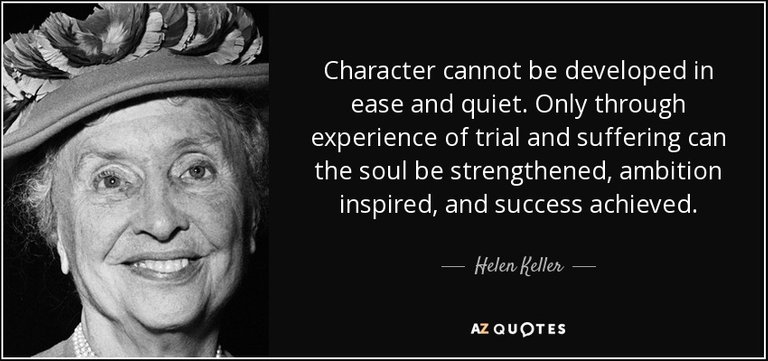
This is amazing part of history that is not often talked about or celebrated. I find it confusing that over a century ago, disable athletes were thriving, but that so much discrimination still exists today in sports in different forms.
Very interesting article! Thanks.
I think baseball is one of the few sports where a deaf player could actually excel. There is not much verbal communication required, players rely more on "sign language" from the coaching staff. Also, not being able to hear could be a benefit as you would not have to endure the crowd noise or trash talking opponents (just a thought).
Yes, it seems quite possible. Audible calls can be more important in some other sports.
It is often observed that, when one of the bodies senses is impaired, the other senses become keener. Perhaps the deaf and dumb athletes had a keen eye for the ball for this reason and hence became successful?
Of course, as you have correctly pointed out, the 'trend' created by the welcoming attitude of the host teams and the iconic success of the two early on 'dummy' players could have resulted in a spurt of 'dummy' players coming up. As you have further pointed out, abilities other than just technical good work and a good eye (muscle power to slug out the ball over the walls for instance) and the resulting 'power play' could have ended that 'trend'.@donkeypong -
Very nice article and with lot of background research. Thanks for sharing.
Upvoted full
Regards,

@vm2904
other greatest female astronomer) was deaf.I read an article by @madmaxfury where he talked about one of the greatest female astronomers ever. Turns out she (and the
Perhaps, where lack of sight force more cognition to be focused on hearing and smell, maybe lack of hearing promotes total concentration on what's in front of you?
Great post! This is another great quote: The only thing worse than being blind is having sight but no vision. Helen Keller
 Best wishes, - @splendorhub
Best wishes, - @splendorhub
That's a good one also. She had a lot of wise things to say.
Indeed! @splendorhub, such a great thing you shared that here. It relates to the blog at the same time the words were powerful. Thanks for sharing.
I'm saving this for future use.
Thank you and best wishes :)
i must say nice comment with pic
Thank you:)
Wow... Although baseball isn't popular in the Philippines, somehow I'm very interested in it. And it's just so amazing how these deaf players from the 1900s contributed to the world of baseball... :) I'm personally interested in the hand signs that the catcher gives to the pitcher. I think, the "battery" would always be the core of the game, but of course... the core wouldn't be able to move forward without the other players. Everyone has his vital role in the game, no matter the disability... If you really want something, you can definitely do it!! ^^ I want to watch baseball live someday... hihi ^^ Thanks for sharing.. would love to read the book/novel you mentioned above, too... ^^
Funny you mention baseball in the Philippines. Where I live in Calbayog City (Samar), we have a department store that carries baseballs, softballs, bats, gloves, etc... and we don't have a baseball field for hundreds of kilometers that I know of!
For real???? Haven't seen any baseball stuff in Cebu... T_T I'd love to at least practice pitching or batting.. hahaha xDDD it'd be awesome to have even a batting center, but to no avail... T_T Nice to meet you here! ^^
Now I have half a mind to set-up what we used to call a "sand-lot" ball field in Calbayog City! I brought Ultimate Beach Frisbee to the city, might as well work on baseball!
That would be awesome... :) If you did, it might even influence some parts of Cebu... and I can finally try playing or watch people playing it!!! hihihi ^^
Still working on bringing Outdoor Racquetball here... having a difficult time generating any interest!
Racquetball is somehow interesting, too... But I don't see any indoor/outdoor racquetball place here, either.. xD
Great post! I myself am a huge fan of baseball, as I have played for almost 20 years, including at the collegiate level. I wasn't aware of the amount of deaf players that have played throughout history.
Amazing, I never even thought about it. Deaf people playing baseball. I'm from UK so baseball is not a sport I follow. I think it is fantastic that we have organisations that strip the prejudices of disability and given those who suffer from physical and mental disabilities the opportunity to take part in what able-bodied people can take for granted, A simple game of Football, soccer, baseball basketball. Today we see more and more sports played by disabled people like Blind football, deaf baseball, Swimming, basketball and we only have to look at the Paraolympics & Invictus to see the progression of the sports. This gives such a boost to those living with a disabilty and also brings HUGE awareness to the public and to the naive (me being one).
Its AMAZING & everyone who is involved in a sport with disability I commend you. Fantastic
I like this article that I have had to read it twice already just trying to understand how easy it is for one to break down because they are challenged. These players could easily never make history because they are deaf, but through their suffering and trial they achieved success and have a place in the books of Baseball records. And you capped it off with Helen Keller's words.
Weldone boss.
That interesting about "strike" and "ball" sign invented by "Dummy", a deaf baseball player. Nice :)
Yeah, it makes so much sense when you think about it, but would never know it without this article.
indeed :)
Yes. Though I have followed the game all my life, I never really thought about how many hand signals there are. Those may have started at this time (some historians say so), though crowd noise may have been another reason they were developed.
The main fact that you want to hide your offensive intentions from the opposition is the main reason "signals" were invented. Now you have defensive signals to communicate without disclosing to the opposition. Deaf players fit right in which made this sport one that they could excell at.
That's certainly a big reason. Umpires' hand signals may have had a different origin, though, perhaps the one suggested here.
Yes, definitely those were intended for the hearing impaired. I guess I was on a different wavelength with signals in general.
Valuable article about deaf baseball players history. Lot of community dont know this sport history if refer to baseball or other sports. But you remind alarm from this post. Absolutely you introduce with use some sources and newspaper article likes etc....
Resteemed your post @donkeypong.
I'm not deaf, but I did play baseball with one arm. There's been more deaf players in the MLB than one-armed players. For the most part, most teammates and coaches treated me like they would any other player. However, when I tried out for the high school team, the team manager refused to talk to me and would barely even look at me.
I thoroughly enjoyed this post. As a ball player myself, I champion the idea of supporting baseball as this country's "real" national pasttime. There is no other sport than can claim the patronage and number of spectators during any one season. "Let's Play Two!" Well done @donkeypong!
When we get sub-communities on here, I'm looking forward to seeing you in a baseball or MLB community. It's my favorite sport also.
I WILL be there! Go Cubs!
It is great to know there were so many deaf players back then, playing baseball. It was also a whole different time to be alive and they would have definitely served as role models to many and been great inspirations.
My conclusion is that disabled people can also make history. Good writing!
Thank you. Everyone deserves the chance.
Unfortunately, I have lost the "chance".
I've played organized baseball almost every year of my life since I was around 6 years old, studied the game, collected the cards, etc, BUT this was completely new info for me. I really appreciate the refreshingly unique post on this topic, and especially for covering baseball outside of others who just run betting pools. Thanks!
Thanks. I certainly learned something in reading and researching about it too.
Nice to see a leader leading by example with some old fashioned quality homegrown work. I'd nominate you to a curation guild for it, but I think you started one already, or something...ha.
Just like these deaf players in baseball, there were lame players in cricket.
It shows that no matter what you are, if you are focused and determined you can do amazing things.
We don't see such players these days though
Sports in general seem much more competitive today. But I'm glad there are games in which disabled athletes can participate.
Yeah, that is a great thing
Wow. I had no idea about this part of Baseball history. I had no idea that so many deaf people played in this sport and are a big part of baseball history. Very interesting. Very glad you shared this with us.
Never seen this quote before and I absolutely love it. This is one of my favorite quotes now, so thank you so much for sharing it @donkeypong.
Wondering how tough it would have been for the deaf players to learn the game, though this would have been and is inspiring as well for othe people, whom god have blessed with all human senses.
Thanks @donkeypong :) for writing such a unique read
Woah there. Didn't know about those famous deaf baseball players. They were called dummy, during this time, people would be really insulted when you call them dummy, but these two, they proved that despite their condition, they can be great. And they didn't only do great, they were the best! I am amazed. I wish there would be more deaf people and even disabled ones in our society today who would engage in this kind of sports. Thanks for sharing @donkeypong! ❤
William “Dummy” Hoy and Luther “Dummy” Taylor died fulfilled, and celebrated according to their life journal.
Today disabled men are engaging more in athletes and sports more than ever before due to mores conducive environment and technical advancement in place nowadays.
Good article @donkeypong
This is a great example that despite any type of handicap someone may have, they still can do amazing things in life. This is why we must always give chance to everyone equally.
Thanks for sharing this wonderful write-up on history mate, I was not aware of this one.
Wish you a great day ahead!
Exactly. I think you said that better than I did. :)
The game in the modern era has become quite demanding and technical.
I really wonder how the deaf players were able to deal with movement and relating with sounds on the pitch, given the importance of the ear as an organ of balance.
They really were amazing to have achieved such historical feats.Wow! Quite an interesting piece @donkeypong.
Good point. Most of them were pitchers, so they depended more on signs from the catcher than on sounds. In Luther Taylor's first game, five runners tried to steal bases on him and he threw all of them out. He then signaled the last one that he could hear them stealing.
Lolz......the runners must have been gobsmacked that he could figure out their moves. Luther Taylor, great guy.
Thanks for sharing @donkeypong
My grandmother once told me 'a disability is a disability of the mind' no matter what obstacles you are facing if you want to really succeed you will succeed.
That's a good statement. Most obstacles are in our minds, though some people are presented with some very large ones to overcome.
True , But no matter how large your obstacles are there is always someone with obstacles larger than yours, This idea can give you motivation and hope to reach your goals!
Thank you for a wonderful post. My uncle is deaf and he is now approaching 70 years old. My father took care of his deaf brother and I saw what a toll it taken on my father to really give his brother the best of things in life.
Deaf people are often the most kind and loving people you will ever meet. The sad part is that people often treat them like they can 'catch' their deafness but simply being around them.
Deaf people are not second class people and if you only knew first hand the emotional toll and what they had to go through everyone would have such great respect for them.
I believe there are tons of great athletic kids who are deaf out there. I'm a huge yankee fan and to learn that the last player in the league was Curtis Pride really breaks my heart.
If you know a deaf person I encourage you to make friends with them. You will find the most gentle and smartest people around with giant hearts.
Thank you for bringing so light to people who are deaf like my uncle.
In the early days of a sport or any new group, the variety of players and recruits is vast, a sort of genetic algorithm for excellence. As the field progresses, the best become the standard and new recruits are judged by those criteria. The game itself starts to change as the players settle into standard "best practices" and eventually it arrives at a particular form.
You see this with something like Mixed Martial Arts. In the early days, it was karate versus sumo versus wrestling versus capoeira -- all styles, all weight classes mixing freely. Over time, the best combinations and skillsets emerged and the styles and bodytypes that didn't fit were phased out by natural selection. Thus we arrived at modern MMA which is basically a fusion of striking, wrestling and jiu-jitsu. The field narrowed.
The OSS was the same. Before they turned into the CIA, they would recruit smugglers and border-runners and all manner of breakbulk roughnecks. Over time, they shifted to only recruiting college-educated Ivy League international relations and Russian linguistics students because that's what the Cold War demanded.
I suspect the recruiting practices of baseball were the same. Recruit everyone at first then pare down as best practices manifest.
Then again, deafness shouldn't really interfere with a baseball player's ability sooooo ... Idunno. Maybe fewer deaf people are striving to get in these days? ¯_(ツ)_/¯
I am new to steemit can you help me plessehello @donkeypong
I like this article a lot! I also have a deaf friend and he is amazing because he is very talented. He can do all things even sports. God is good
I like this article a lot! I also have a deaf friend and he is amazing because he is very talented. He can do all things even sports. God is good
That's great history sharing
thanks donkeypong
Deaf players could feel the vibrations during game play since they had a better developed senseof touch and feel.
Thank for sharing information history sports @donkeypong. Very good your post.
Character cannot be developed in ease and quiet. Only through experience of trial and suffering can the soul be strengthened, ambition inspired, and success achieved. _______ Helen Keller
Deaf players... Wow, being deaf didn't even stop them.... Thanks for sharing, it's always cool to know a few things that happened even before I was born
thanks for share @donkeypong
baseball is not a very popular sport in Indonesia. And as far as I know there has not been so many sportsman with special needs that able to become a good hits here. Only those who compete in Paralympic games perhaps.
this is the things that my people has to improve, equality.
you guys has done that for
Great publishing....
Go ahead... with your important thingsThats great contribution to share others baseball history @donkeypong. You let to some measure to the community if we like some sports before need to know their history. "Deaf Players- Sounds be good.
Intresting! Thanks for sharing
Interesting. I don't get this game at all
Ha, try explaining it to a foreigner! :/
Interesting. I don't get this game at all
Wow great write up. Actually segregation in sports have ceased and these days, more physically challenged people will compete more in the games
LoL! dissing by sign language at the umpire...
Hardwork and passion beats disability
Superb.
This is a post full of information about baseball for someone like me, though I have not been a fan of baseball but football.@donkeypong
I think this piece is giving anyone who is handicapped in any form that he/she can take part in any sport of their choice because even here in Ibadan, Oyo State, Nigeria, I see various handicapped people move in and out of some stadium wherr they participate in all sorts of sport of their choice, I really feel happy for them.
Thank for sharing this...
@bekky
great info
Loved to know about those deaf player's who struggled and work hard and were able to make a name in base ball. Very intersting topic great post sir ! Upvoted
thank you for sharing my likes of her
Very informative thanks to shared this I really admired those people mention on this @donkeypong I up voted this.
it's good buddy
The idea of living on ones past glory is not that good you will always been seen as a second quality, if you want to bring back the glory days you have to show the world you are worth it and they will be doing a big mistake not to take you. Love the writeup deformity does not determine one's approach in live, you are the one who design the way your life will turn out